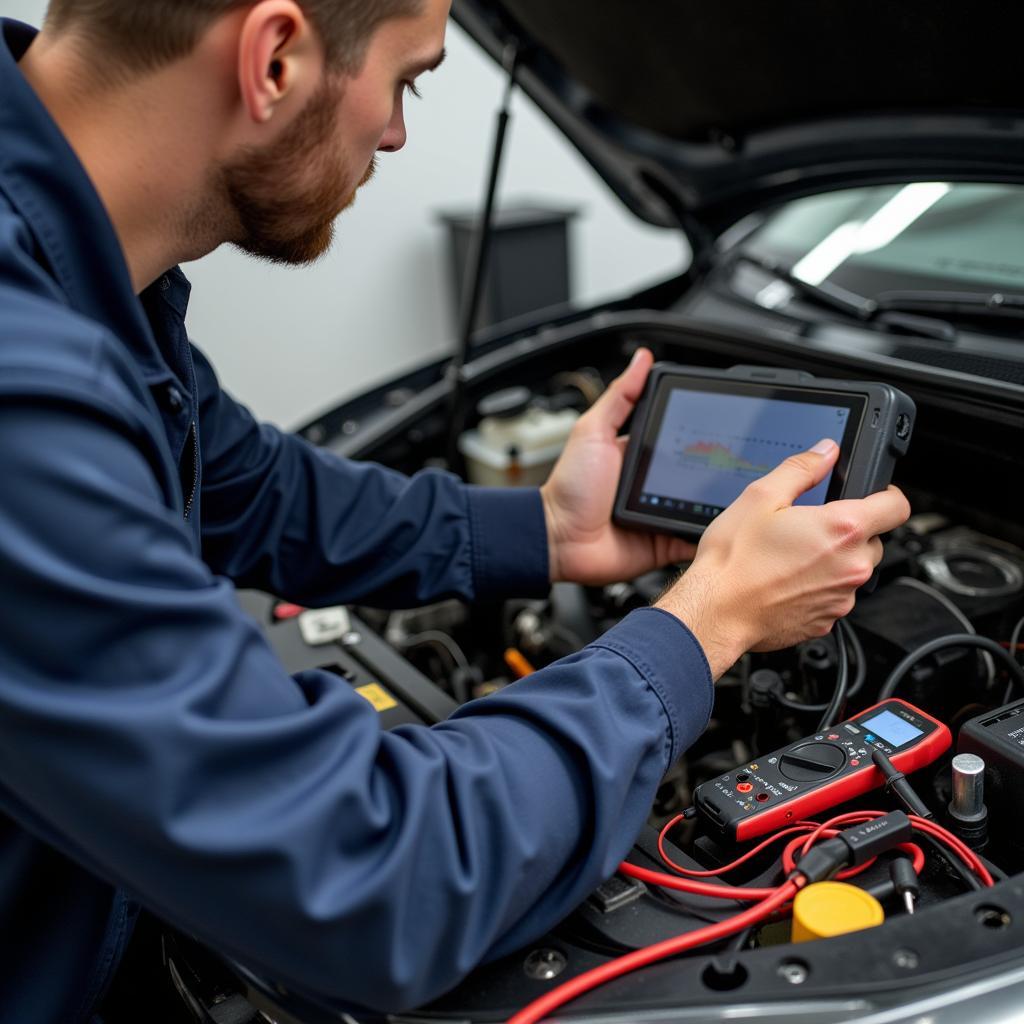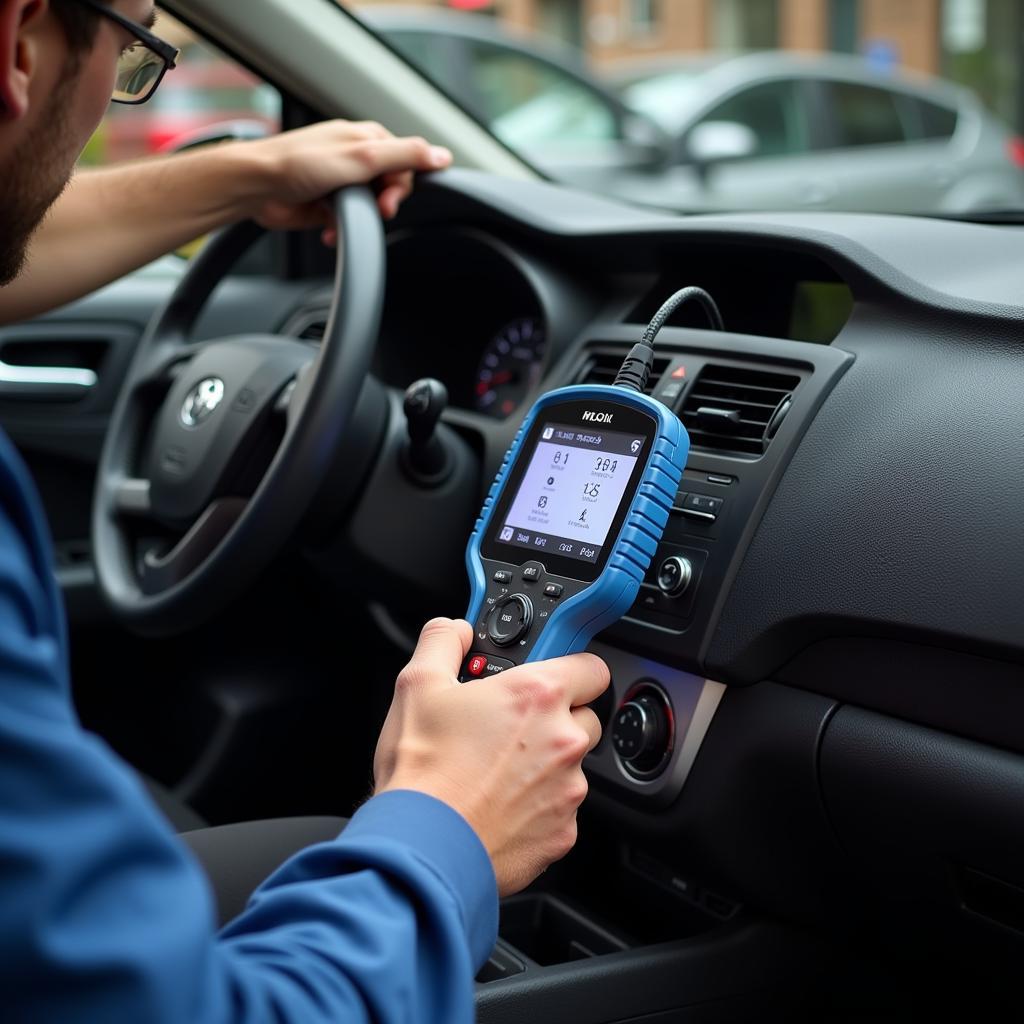Car diagnostics is a crucial process that involves using specialized equipment to analyze your vehicle’s computer system and various components to identify potential problems. This technology has revolutionized car repair, shifting from traditional, often time-consuming methods to a more precise and efficient approach. By understanding the language of your car’s computer, mechanics can pinpoint issues and provide accurate solutions, saving you time and money in the long run.
The Importance of Car Diagnostic Testing
Think of car diagnostics as a doctor’s visit for your vehicle. Just like a doctor uses various tests to diagnose a patient’s condition, car diagnostics uses advanced scanners and software to communicate with your car’s computer, retrieving valuable information about its health. This data helps identify current or potential issues that might affect your car’s performance, safety, or fuel efficiency.
 Car Diagnostic Tools
Car Diagnostic Tools
How Does Car Diagnostics Work?
Modern cars are equipped with Electronic Control Units (ECUs), often referred to as the “brain” of the vehicle. These ECUs monitor and control various systems, including the engine, transmission, brakes, emissions, and more.
When you take your car for a diagnostic test, a mechanic connects a scan tool to your car’s OBD-II port, usually located under the dashboard. This tool communicates with the ECUs, retrieving Diagnostic Trouble Codes (DTCs). These codes act as indicators, highlighting specific areas within the vehicle’s systems that require attention.
Benefits of Regular Car Diagnostics
Regular car diagnostics offer a range of benefits, such as:
- Early Problem Detection: Identifying issues early can prevent costly repairs down the line.
- Improved Performance: Addressing minor issues can optimize your car’s performance and fuel efficiency.
- Enhanced Safety: Diagnosing problems with brakes, airbags, or other safety systems ensures your car is safe to drive.
- Increased Resale Value: A well-maintained car with a documented diagnostic history is more attractive to potential buyers.
 Mechanic Performing Car Diagnostics
Mechanic Performing Car Diagnostics
What Can Car Diagnostics Detect?
Car diagnostics can identify a wide array of issues, including:
- Engine problems (misfires, knocking, etc.)
- Transmission malfunctions
- Brake system issues
- Airbag system faults
- Electrical problems
- Emission control system problems
- And more
What to Do When Your Check Engine Light Turns On?
The dreaded “check engine” light can be a source of anxiety for car owners. While it doesn’t always indicate a major issue, it’s crucial not to ignore it.
When this light illuminates, it suggests that your car’s computer has detected a problem. This is where car diagnostics comes in. By connecting a scan tool, a mechanic can retrieve the specific trouble codes triggered by the issue, providing valuable insights into the problem’s nature and severity.
Car Diagnostics vs. Visual Inspection
While a visual inspection by a mechanic is valuable, it might not always reveal underlying issues. Car diagnostics delves deeper, analyzing the data recorded by your car’s computer system. This comprehensive approach provides a more accurate and detailed picture of your car’s health, allowing for precise repairs and maintenance.
 Car Diagnostic Report
Car Diagnostic Report
How Much Does Car Diagnostics Cost?
The cost of car diagnostics can vary depending on factors like your location, the complexity of the issue, and the mechanic’s hourly rate. However, investing in regular diagnostic tests is a proactive approach to car maintenance that can save you significant money on potentially larger repairs in the future. For a better understanding of the cost involved, you can check out our detailed guide on how much does a car computer diagnostic cost.
Conclusion
Car diagnostics has become an indispensable tool in modern car repair and maintenance. Its ability to pinpoint issues accurately and efficiently makes it essential for ensuring optimal vehicle performance, safety, and longevity.
Regular car diagnostics, along with routine maintenance, are the keys to keeping your car running smoothly and avoiding unexpected breakdowns. Remember, a healthy car is a happy car!
FAQs
1. How often should I get my car diagnosed?
It’s generally recommended to get your car diagnosed at least once a year or every 12,000 miles, whichever comes first.
2. Can I perform car diagnostics myself?
While DIY car diagnostic tools are available, it’s best to leave this task to qualified mechanics who have the expertise and experience to interpret the data accurately.
3. Does car diagnostics void my car’s warranty?
No, car diagnostics itself does not void your car’s warranty. In fact, it can be beneficial for warranty claims as it provides documented proof of any issues detected.
4. What is the difference between OBD-I and OBD-II?
OBD-I was an earlier version of the On-Board Diagnostics system, while OBD-II is the current standard used in most vehicles manufactured after 1996. OBD-II offers more comprehensive diagnostic capabilities and a standardized connector.
5. Can car diagnostics detect problems with my car’s air conditioning?
Yes, car diagnostics can detect problems with your car’s air conditioning system, such as refrigerant leaks or sensor malfunctions.
For more informative articles on car diagnostics and other car-related topics, explore our website!
Need help with your car? Contact our expert team via WhatsApp: +1(641)206-8880 or Email: [email protected]. We’re here for you 24/7.

Leave a Reply